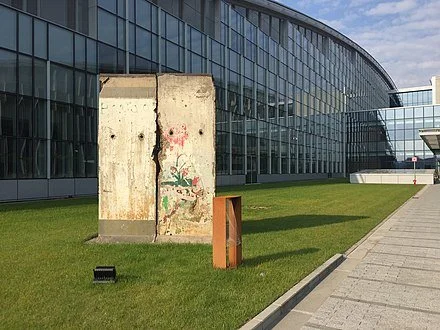David Warsh: Squeezed between pushing democracy and fighting global warming
The Fall of the Berlin Wall, in 1989, marked a huge turning point in NATO's role in Europe. Here you can see section of the wall displayed outside NATO headquarters, in Brussels.
SOMERVILLE, Mass.
Which is the more pressing concern: advancing the cause of democracy in the face of opposition, or combatting global warming?
NATO enlargement has been the policy of the United States since Bill Clinton was first elected president, in 1992. The course of action he adopted was embraced and extended by successors George W. Bush and Barack Obama.
Was it a good idea?
Anne Applebaum thinks so. The Pulitzer Prize-winning author and journalist has been among NATO expansion’s most ardent advocates since becoming a correspondent for The Economist, in 1988, and moving to Warsaw. In a panel podcast last week for The Atlantic, where she is now a contributing writer, she said,
I think that the expansion of NATO was the most successful, if not the only successful, piece of American foreign policy of the past thirty years. It created a zone of safety and security for sixty million people in part of the world that has been the source of two world wars…. We would be having this fight in East Germany now if we had not done it.
I have been on the other side of that argument for nearly twenty years, a thin voice in the back of a relatively small chorus of dissenters that included, in 1994, Defense Secretary Les Aspin, his deputy William Perry, and most senior American military commanders at the time; in 1996, diplomat George Kennan and a group of distinguished foreign-policy experts; and, that same year, Brent Scowcroft, a lone authority from the administration of George H. W. Bush.
In 2018, in Because They Could: The Harvard-Russia Scandal (and NATO Expansion) after Twenty-five Years, I wrote, “No aspect looms larger in these 25 years [of US-Russia relations] than the story of NATO enlargement.”
Now that Vladimir Putin has sent the Russian army to invade Ukraine, the reasoning behind NATO enlargement has become ripe for reassessment– not now, while people are fighting, dying and fleeing, but after the carnage has ended, And then only gradually, calmly, without rancor.
Who know what drove Putin crazy enough to invade Ukraine? That’s for analysts, biographers and historians to puzzle out. Certainly apprehension over NATO expansion was part of it. So was his experience as “a boy once bullied in the back streets of Leningrad.” Meanwhile, the costs of his war are already staggering. Not just the loss of Ukrainian sovereignty. Nor Russian civil society’s forty years’ of gains since the former Soviet Union began to come apart.
The opportunities that mattered most had lain ahead. Good-faith cooperation among nations to control emission, adapt habitats and reduce solar radiation will be harder to organize than it would have been otherwise.
Even if the fondest dreams of the NATO expansionists are realized – if Russian elites and everyday citizens combine to overthrow Putin – this disastrous war makes the steadily increasing pressure on Russia’s borders seem like a hell of a risk to have run.
The problem of Taiwan is next.
Grounds for rapprochement can be found in the years ahead, but the search will require policy-makers of more sober temperament and, even then, many years will be required to restore the trust and mutual respect that has been lost.
xxx
Bill Clinton made it official in1994: NATO expansion would take place “not whether but when.” Harvard historian Tim Colton wrote in his 2008 biography of Boris Yeltsin, “A ticking time bomb had been set.” It took four more U.S. presidencies – George W. Bush, Barack Obama, Donald Trump, and Joe Biden – for it to explode.
Meanwhile, Vice President Al Gore in 1993 persuaded Clinton to formally commit the nation to the Rio de Janeiro targets for greenhouse gas emissions, but conservative politicians continued to scoff.
David Warsh is a veteran columnist and an economic historian. He’s also proprietor of Somerville-based economicprincipals.com, where this column first ran.
